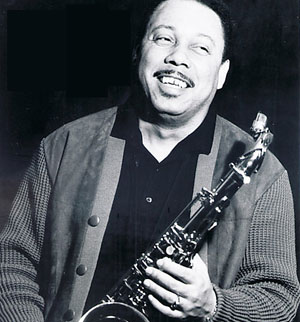Lucky Thompson, tenor saxophonist, was born in Columbia, SC on June 16, 1924. He bridged the gap between swing’s physical energy and bebop’s cerebral intricacies. He became a leading practitioner of the instrument and an outstanding stylist. Eli Thompson’s nickname, the result of a jersey given to him by his father with the word “lucky” stitched across his chest, would prove bitterly inappropriate. Thompson lost his mother at five years old, and spent the rest of his childhood living in Detroit. Thompson was a musician, but he didn’t have the funds to buy an instrument. He ran errands in order to make enough money to purchase a book with a fingering chart and instructions on how to play the saxophone. Thompson then made imitation lines and keys out of a broom handle to learn how to read music. Legend has it that Thompson received his first saxophone accidentally. A delivery company dropped one off at Thompson’s home. He then went on to work briefly as a barber and graduated high school. Thompson signed up with Erskine Hawkins and the ‘Bama State Collegians. He toured with the group until 1943 when he joined Lionel Hampton. Thompson arrived in New York shortly after his arrival. He was asked to replace Ben Webster at his 52nd Street gig the Three Deuces. Webster, Coleman Hawkins and Lester Young were all present at Thompson’s first gig. Although he considered it a disaster, Thompson quickly gained the respect of his peers, and he became a regular fixture at clubs. After touring with Slam Stewart, Thompson joined Billy Eckstine’s band, which included Dizzy Gillespie and Charlie Parker. Thompson was a part of some of the most important bop dates. However, he never fit into the movement’s mold. His playing had an elegance and formal power that was unmatched by any other tenor. He also displayed an emotional depth that is rare among his peers. In late 1944, he joined the Count Basie Orchestra, but he left the orchestra in Los Angeles the next year. He remained there until 1946, where he played on and arranged a number of dates for the Exclusive label. Thompson was hired by Gillespie to replace Parker in their legendary combo. He also participated on Parker’s March 28, 1946 session for Dial. In the same year, he was also a member of Charles Mingus’s Stars of Swing, which was unfortunately never recorded. Thompson made his return to New York in 1947 with his own band, at the Savoy Ballroom. He made his European debut at Nice Jazz Festival the following year and continued to play on sessions with Miles Davis and Thelonious Monk (the seminal Walkin’). Thompson was backed by the Lucky Seven, which included pianist Jimmy Powell and trumpeter Harold Johnson. He returned to the studio the next month. He remained mostly a sideman throughout his career. However, he enjoyed a fruitful collaboration with Milt Jack that produced several LPs in the mid-’50s. Many musicians and industry executives found Thompson difficult to work with. He was well-known for his outspoken views on the unfair power that music publishers, record labels and booking agents had over jazz. In February 1956, he moved his family to Paris to escape these “vultures”. He joined Stan Kenton on his French tour two months later, and even returned to the U.S. to join Kenton’s group. However, he was soon blacklisted by Joe Glaser, Louis Armstrong’s manager. This happened after a strange dispute with the jazz legend over who should be first to board their plane. He returned to Paris and cut several sessions with Eddie Barclay, but he was unable to find steady work. Thompson remained in France through 1962. He returned to New York the following year, and was once again headlining the Prestige album Plays Jerome Kern and No More. Hank Jones was also featured on Thompson’s set. Thompson lost his wife at the same time. He struggled to care for their children alone and his old battles against the jazz power structure remained. In 1966, he officially announced his retirement to Down Beat magazine. He returned to active duty within a few months, but was still frustrated by the industry and his own abilities — during the March 20, 1968 date recorded on the Candid CD Lord Lord Am I Ever Going To Know?, Thompson said that he felt he had only scratched the top of what he knew he could do. Thompson spent the period 1968-1970 in Lausanne (Switzerland), where he toured extensively across Europe. He returned to the U.S. in 1970 to teach music at Dartmouth University, and to record his last album, “I Offer You” in 1973. Thompson’s remaining years are largely unknown. He spent many years on Manitoulin Island, Ontario, before moving to Savannah, GA. There, he traded his saxophones for dental work. After a long period of homeless, he eventually moved to the Pacific Northwest and checked into Seattle’s Columbia City Assisted Living Center. Thompson was in assisted care until his passing on July 30, 2005.
